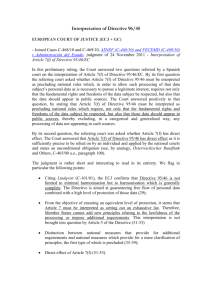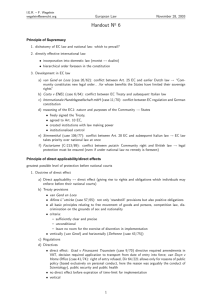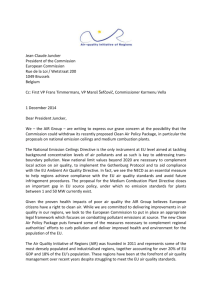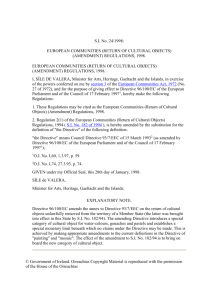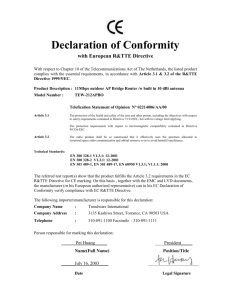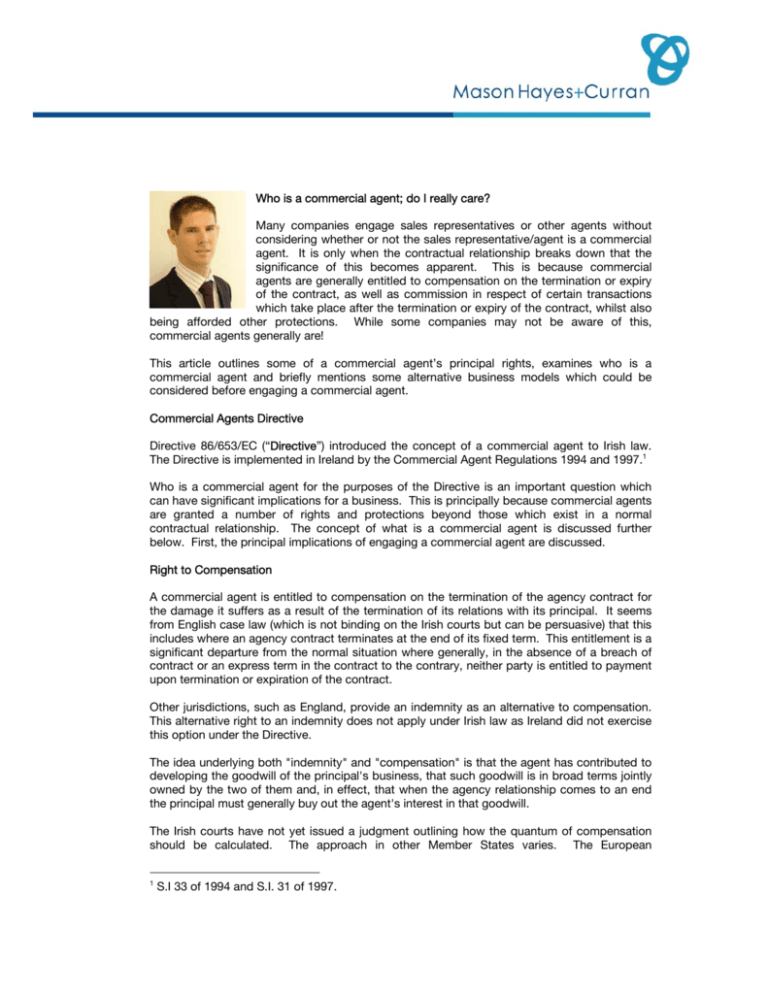
Who is a commercial agent; do I really care?
Many companies engage sales representatives or other agents without
considering whether or not the sales representative/agent is a commercial
agent. It is only when the contractual relationship breaks down that the
significance of this becomes apparent. This is because commercial
agents are generally entitled to compensation on the termination or expiry
of the contract, as well as commission in respect of certain transactions
which take place after the termination or expiry of the contract, whilst also
being afforded other protections. While some companies may not be aware of this,
commercial agents generally are!
This article outlines some of a commercial agent’s principal rights, examines who is a
commercial agent and briefly mentions some alternative business models which could be
considered before engaging a commercial agent.
Commercial Agents Directive
Directive 86/653/EC (“Directive”) introduced the concept of a commercial agent to Irish law.
The Directive is implemented in Ireland by the Commercial Agent Regulations 1994 and 1997.1
Who is a commercial agent for the purposes of the Directive is an important question which
can have significant implications for a business. This is principally because commercial agents
are granted a number of rights and protections beyond those which exist in a normal
contractual relationship. The concept of what is a commercial agent is discussed further
below. First, the principal implications of engaging a commercial agent are discussed.
Right to Compensation
A commercial agent is entitled to compensation on the termination of the agency contract for
the damage it suffers as a result of the termination of its relations with its principal. It seems
from English case law (which is not binding on the Irish courts but can be persuasive) that this
includes where an agency contract terminates at the end of its fixed term. This entitlement is a
significant departure from the normal situation where generally, in the absence of a breach of
contract or an express term in the contract to the contrary, neither party is entitled to payment
upon termination or expiration of the contract.
Other jurisdictions, such as England, provide an indemnity as an alternative to compensation.
This alternative right to an indemnity does not apply under Irish law as Ireland did not exercise
this option under the Directive.
The idea underlying both "indemnity" and "compensation" is that the agent has contributed to
developing the goodwill of the principal's business, that such goodwill is in broad terms jointly
owned by the two of them and, in effect, that when the agency relationship comes to an end
the principal must generally buy out the agent's interest in that goodwill.
The Irish courts have not yet issued a judgment outlining how the quantum of compensation
should be calculated. The approach in other Member States varies. The European
1
S.I 33 of 1994 and S.I. 31 of 1997.
Commission suggests, in its 1996 report on the Directive, that in France it is custom to fix
compensation at the total sum of the last two years’ gross commission or the sum of two
years’ gross commission calculated over the last three years of the agency.
This approach was initially adopted in the United Kingdom but more recently has not found
favour in the English courts and was ultimately rejected by the House of Lords in Lonsdale
earlier this year.2 In this case, the House of Lords ruled that the damage for which the agent
must be compensated is the value of the right to be an agent; that is, the right to future
commissions that the agency would have brought in. The Lords emphasised that, like any
other exercise in valuation, the question is what a buyer could reasonably have been expected
to pay, as at the date of termination, for the rights the agent had been enjoying. It considered
that it was not enough to ask what the agent would have expected to receive, if no-one would
actually have given it to him. It will be interesting to see if the Irish courts follow this approach.
Compensation (and, where applicable, also an indemnity) is not payable in a number of
exhaustively prescribed circumstances. These include where the principal has terminated the
agency contract because of default attributable to the agent which would justify immediate
termination of the contract under national law. This is a significant threshold to satisfy.
However, where it is met, a principal should actively terminate the agreement, rather than allow
the contract to expire by the passing of time. Otherwise, the agent may retain his right to
compensation. However, as in any case, any decision to terminate should not be taken lightly
and any strategic considerations should be taken into account before acting upon any
decision.
Right to Commission
Commercial agents are entitled to commission unless another form of payment has been
agreed between the parties. If the parties do not decide on the remuneration or level of
commission to be paid, a commercial agent is entitled under the Directive:
to the remuneration that agents appointed for the goods forming the subject of the
contract are customarily allowed in the place where it carries on his activities; or
if there is no such customary practice, to reasonable remuneration taking into account
all the aspects of the transaction.
It is accordingly in the interests of the principal to reach up-front agreement on the means of
payment as, otherwise, the agent may end up being entitled to more than would have
otherwise been agreed between the parties.
The Directive also lays down which transactions give a commercial agent an entitlement to
commission. These can be broken down into two distinct categories which are considered
below.
2
Lonsdale v Howard & Hallam [2007] UKHL 32.
Transactions concluded during the term
Under the Directive, a commercial agent is entitled to commission on commercial transactions
concluded during the period covered by the agency contract where:
the transaction has been concluded as a result of the agent’s action;
the transaction is concluded with a third party whom the agent has previously acquired
as a customer for transactions of the same kind; or
the agent has an exclusive right to a specific geographical area or group of customers
and where the transaction has been entered into with a customer belonging to that
area or group.3 This is the case even if the customers were not acquired by the agent
or the transaction was entered into without his involvement at any stage.
Transactions concluded post termination/expiration
A commercial agent is also entitled under the Directive to commission on commercial
transactions concluded after the agency contract has terminated (and, it seems from English
case law, after its expiry) if:
the transaction is mainly attributable to the agent's efforts during the period covered
by the agency contract and the transaction was entered into within a reasonable
period after that contract terminated; or
the order of the third party reached the principal or the agent before the agency
contract terminated.
Can the right to commission be limited?
The right to commission can effectively be excluded by agreeing a flat rate of payment to the
agent. This is because the right to commission is stated not to apply if the agent is not
remunerated wholly or in part by commission. However, care should be taken in this respect
as it has been held in England in the Mercantile case that allowing an agent to independently
set, and receive, a mark up on the goods equated to an entitlement to commission and not
remuneration.4 This meant that the agent was entitled to the rights afforded to commercial
agents. While this case can probably be distinguished on its facts, it illustrates that care
should be taken when dealing with the Directive.
The Directive provides that the right to commission, where it arises, can only be extinguished if
and to the extent that it is established that the contract between the third party and the
3
The Directive provided an alternative to this which has been availed of by other Member
States. This is where the agent is entrusted with (as opposed to having an exclusive right to) a
specific geographical area or group of customers and where the transactions has been entered
into with a customer belonging to that area or group
4
Mercantile International Group plc v Chuan Soon Huat Industrial Group plc [2002] EWCA Civ
288.
principal will not be executed and that fact is due to a reason for which the principal is not to
blame.
This indicates that the right to commission cannot be contracted out of. However, it is
arguable that by careful drafting the extent of the right to commission can be agreed between
the parties which may reduce, and potentially limit, the scope of the right beyond that which
otherwise might have arisen in the absence of agreement.
This is based upon the premise that the right is not being extinguished, but rather, its scope (or
meaning) for the purposes of the parties’ particular arrangement has been agreed at arms’
length between the parties. For instance, it could be stated in the agreement that for the
purposes of the right to post termination commission, a reasonable period is three months. It
would be difficult for an agent to then try and argue that six months is a reasonable period
where it has previously agreed that three months is reasonable.
Good Faith
The Directive also imposes good faith obligations on the parties. A commercial agent is
required to look after its principal’s interests and act dutifully and in good faith. Similarly, a
principal is required to act dutifully and in good faith in its relations with its commercial agent.
This can have a number of implications. For instance, it may arguably prevent a principal from
constructing a situation where the agent will have no choice but to terminate as the principal
may be seen to have acted in breach of its obligation of good faith in such circumstances.
Notice for termination
The Directive also prescribes minimum periods of notice required to terminate a commercial
agency which has been concluded for an indefinite period, namely, one month for the first year,
two months for the second year and three months for the third year. The Directive provides
that the parties may not agree on shorter periods of notice. Further, if longer periods are
agreed, the period for the principal must not be shorter than that for the agent. The Directive
also provides an option for Member States to provide for four months notice for the fourth
year, and so on. Ireland did not exercise this option.
These notice periods apply to fixed term agency contracts where they continue to be
performed by the parties after the expiration of the fixed term.
Who is a commercial agent?
This brings us back to the question of who is a commercial agent. A commercial agent is:
“a self-employed intermediary who has continuing authority to negotiate the sale or
purchase of goods on behalf of another person, hereinafter called “the principal”, or to
negotiate and conclude such transactions on behalf of and in the name of the
principal”.
On first glance, this definition seems quite straightforward. However, the way in which its
constituent elements have been interpreted by the courts is not what you would expect on its
initial reading.
Goods not services
Significantly, the Directive only relates to where a commercial agent deals with goods on
behalf of another. Thus, a person who promotes or sells services on behalf of another should
not fall within the ambit of the Directive.5 However, the dividing line between what is a good
and what is a service is not always clear. The uncertainty in this regard is exacerbated by the
absence of a definition of a good in the Directive.
Some recent cases illustrate how far the concept of a good can go. In the English case of
Whether or not the provision of cargo space is a
good or a service was considered to be sufficiently unclear as to warrant a reference to the
European Court of Justice.7
Tamarind it was held that gas is a good.6
Another example of uncertainty is whether the supply of software is a good or a service. It
seems following the English case of St. Albans City that software may be considered a good if
it is supplied by a physical medium, but that it may be a service if it is supplied by e-mail or is
downloaded via the Internet.8 While it has commonly been thought that St. Albans would be
followed in Ireland, the position has been complicated by the adoption of the Consumer
Protection Act 2007 which refers to software as a good. Ultimately, this point is a matter for
the European courts as goods, for the purposes of the Directive, should be given its European
(as opposed to domestic) meaning.
A self-employed intermediary
The expression “self-employed intermediary” is also given its European meaning. In the
English case of AMB Imballagi Plastici SRL the expression was considered akin to the
expression “independent contractor”. 9 Therefore, an individual sole trader, a partnership or a
registered company can be a self-employed intermediary.
What does negotiate mean?
It was held in the recent Irish High Court case of Kenny v Ireland ROC Limited that the
definition of a commercial agent does not require “what may be termed active negotiation or
bargain by bid and counter bid”.10 The test adopted was “whether, having regard to the
manner in which the sale of goods is carried out, it is necessary for the agent to bring a
material level of skill to the activity”. It was considered by Clarke J in this case that the test
could be satisfied by an agent’s use of skill in the marketing, promotion or presentation of the
5
Certain countries, such as France, protect commercial agents who deal with services; Article
L 134-1 al 1 of the French commercial code.
6
Commercial Court [2000] EuLR 708.
7
Pace Airline Services v. Aerotrans Luftfahtagentur GmbH, High Court of Justice, Queen's
Bench Division (Commercial Court) (England and Wales), (23 November 1998 unreported),
Case C-64/99. The reference was withdrawn before this issue fell to be considered by the
European court.
8
[1996] 4 All ER 481.
9
[1999] 17 Tr LR 557.
10
[2005] IEHC 24.
product rather than hands on negotiation of sales which arguably may include marketing
agents. The broad meaning given in Ireland to the concept of negotiation is broader than that
historically adopted by the English courts.
Can the Directive be avoided?
Given the broad concept of a commercial agent, and the various rights afforded to them,
attempts have been made to avoid the application of the Directive by stipulating that an
agency contract is governed by the law of a non-Member State. However, the European Court
of Justice confirmed in Ingmar that this will not be effective where there is a real connection
with the EU.11 The court held in this case that a principal established in a non-Member State
country, whose commercial agent carried on its activity within the EU, should not be able to
evade the provisions of the Directive by use of a choice of law clause.
As a result of Ingmar, it is difficult to avoid the application of the Directive. For this reason,
alternative models to the appointment of an agent could possibly be considered. There are, of
course, a number of reasons for appointing agents. For instance, it may be to take advantage
of the agent’s local knowledge or established trade connections, or to save the cost of having
to establish your own selling operation.
However, there are alternative models which could possibly be considered before simply
engaging an agent. At its simplest, it may work out cheaper in the long run to employ an
employee to perform the functions of an agent. In this way, sufficient control can be retained
over the sales function. Similarly, it could be considered whether it may be more beneficial to
employ a distributor rather than an agent. However, in this case the degree of control over the
sale of your products may be diminished and it may have other negative effects, for instance,
in a market where close contact with customers are important. Also, competition law may be
relevant in the context of a reseller arrangement whereas it generally does not apply in the
context of a real agency or employment relationship.
While these decisions are generally not made based upon the potential application of the
Directive, alternative models should nevertheless be considered as other benefits may reveal
themselves upon closer consideration. Either way, as this article reveals, organisations should
think twice before engaging an agent.
Attribute to Robert McDonagh, Senior Associate, Mason Hayes+Curran.
Robert is a senior associate in the commercial department at Mason Hayes+Curran. For more
information, please contact Robert at rmcdonagh@mhc.ie or + 353 1 614 5077. The content of
this article is provided for information purposes only and does not constitute legal or other
advice. Mason Hayes+Curran (www.mhc.ie) is a leading business law firm with offices in
Dublin, London and New York.
© Copyright Mason Hayes+Curran 2007. All rights reserved.
11
Case C-381/98.


